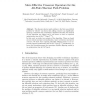Free Online Productivity Tools
i2Speak
i2Symbol
i2OCR
iTex2Img
iWeb2Print
iWeb2Shot
i2Type
iPdf2Split
iPdf2Merge
i2Bopomofo
i2Arabic
i2Style
i2Image
i2PDF
iLatex2Rtf
Sci2ools
159
click to vote
PPSN
2010
Springer
2010
Springer
More Effective Crossover Operators for the All-Pairs Shortest Path Problem
The all-pairs shortest path problem is the first non-artificial problem for which it was shown that adding crossover can significantly speed up a mutation-only evolutionary algorithm. Recently, the analysis of this algorithm was refined and it was shown to have an expected optimization time of (n3.25 (log n)0.25 ). In this work, we study two variants of the algorithm. These are based on two central concepts in recombination, repair mechanisms and parent selection. We show that repairing infeasible offspring leads to an improved expected optimization time of O(n3.2 (log n)0.2 ). Furthermore, we prove that choosing parents that guarantee feasible offspring results in an optimization time of O(n3 log n).
Algorithm | All-pairs Shortest Path Problem | Distributed And Parallel Computing | Expected Optimization Time | PPSN 2010 |
| Added | 14 Feb 2011 |
| Updated | 14 Feb 2011 |
| Type | Journal |
| Year | 2010 |
| Where | PPSN |
| Authors | Benjamin Doerr, Daniel Johannsen, Timo Kötzing, Frank Neumann, Madeleine Theile |
Comments (0)

